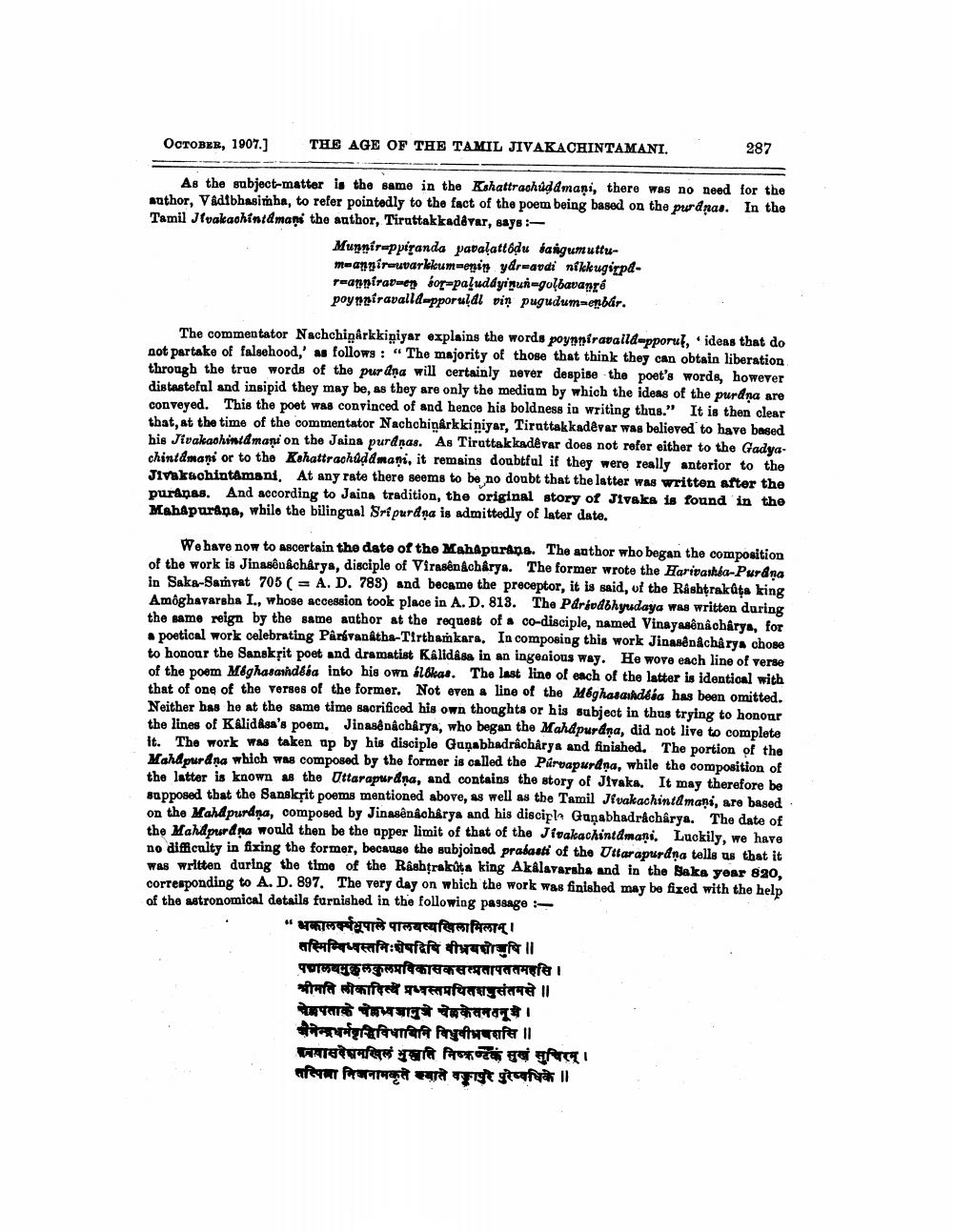________________
OCTOBER, 1907.]
THE AGE OF THE TAMIL JIVAKACHINTAMANI.
As the subject-matter is the same in the Kshattrachudamani, there was no need for the author, Vâdibhasimha, to refer pointedly to the fact of the poem being based on the purdnas. In the Tamil Jfvakachintamani the author, Tiruttakkadêvar, says :
Munnirappiranda pavalattóḍu bangumuttum-annir-uvarkkummenin ydr-avdi nikkugirpar-annirav-en sor-paludayinun-golbavanré poynniravalla-pporuldl vin pugudum-enbár.
287
The commentator Nachchinârkkiniyar explains the words poynniravalld-pporul, ideas that do not partake of falsehood,' as follows: "The majority of those that think they can obtain liberation. through the true words of the purana will certainly never despise the poet's words, however distasteful and insipid they may be, as they are only the medium by which the ideas of the purana are conveyed. This the poet was convinced of and hence his boldness in writing thus." It is then clear that, at the time of the commentator Nachchinârkkiniyar, Tiruttakkadêvar was believed to have based his Jivakashintamani on the Jaina puranas. As Tiruttakkadêvar does not refer either to the Gadyachintamani or to the Kehattrachûddmani, it remains doubtful if they were really anterior to the Jivakschintamani. At any rate there seems to be no doubt that the latter was written after the puranas. And according to Jaina tradition, the original story of Jivaka is found in the Mahapurana, while the bilingual Sripurana is admittedly of later date.
We have now to ascertain the date of the Mahapurana. The author who began the composition of the work is Jinasênâchârys, disciple of Virasênacharya. The former wrote the Harivashia-Purana in Saka-Samvat 705 (= A. D. 788) and became the preceptor, it is said, of the Rashtrakuta king Amôghavarsha I., whose accession took place in A. D. 813. The Párivdbhyudaya was written during the same reign by the same author at the request of a co-disciple, named Vinayasênâchârya, for a poetical work celebrating Pârávanâtha-Tirthamkara. In composing this work Jinasênâchârya chose to honour the Sanskrit poet and dramatist Kâlidâsa in an ingenious way. He wove each line of verse of the poem Méghasadésa into his own slokas. The last line of each of the latter is identical with that of one of the verses of the former. Not even a line of the Meghasadééa has been omitted. Neither has he at the same time sacrificed his own thoughts or his subject in thus trying to honour the lines of Kalidasa's poem. Jinasênâchârya, who began the Mahapurana, did not live to complete it. The work was taken up by his disciple Gunabhadracharya and finished. The portion of the Mahapurana which was composed by the former is called the Purvapurdna, while the composition of the latter is known as the Uttarapurana, and contains the story of Jivaka. It may therefore be supposed that the Sanskrit poems mentioned above, as well as the Tamil Jivakachintamani, are based on the Mahapurana, composed by Jinasênâcharya and his disciple Gunabhadracharya. The date of the Mahapurdna would then be the upper limit of that of the Jivakachintamani. Luckily, we have no difficulty in fixing the former, because the subjoined prasasti of the Uttarapurana tells us that it was written during the time of the Rashtrakuta king Akalavarsha and in the Saka year 820, corresponding to A. D. 897. The very day on which the work was finished may be fixed with the help of the astronomical details furnished in the following passage:
** wwwwgui aff! तस्मिन्विध्वस्तनिःशेषदिषि वीभ्रयशोजुषि ।। पद्मालयमुलकुलप्रविकासकसत्प्रतापततमहसि । श्रीमति लोकादित्ये प्रध्वस्तमथितशचुसंतमसे ॥ Argü Ürkway*
lyffemfft Prefer wwwtenfant gut Nevevičs qui ofret | तत्पिमा निजनामकृते कमाते वङ्गापुरे पुरेष्यधिके ॥




